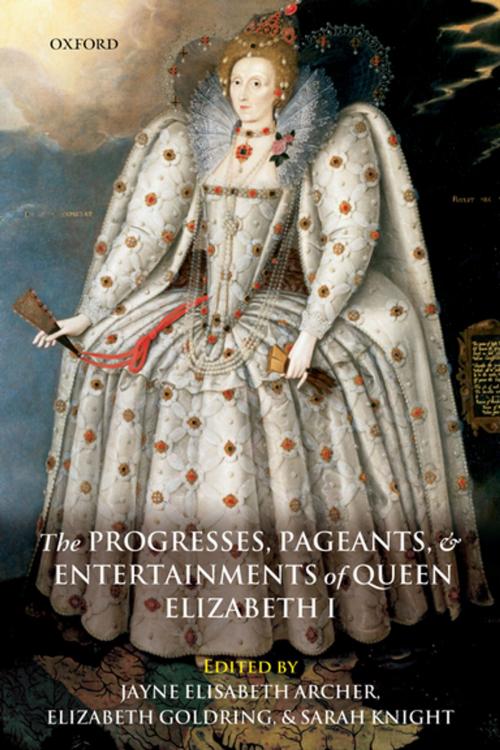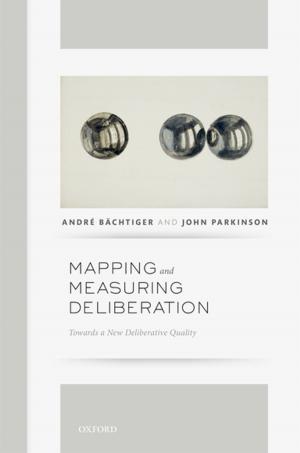The Progresses, Pageants, and Entertainments of Queen Elizabeth I
Nonfiction, Entertainment, Drama, Anthologies, Fiction & Literature, Literary Theory & Criticism, History| Author: | ISBN: | 9780191608797 | |
| Publisher: | OUP Oxford | Publication: | March 29, 2007 |
| Imprint: | OUP Oxford | Language: | English |
| Author: | |
| ISBN: | 9780191608797 |
| Publisher: | OUP Oxford |
| Publication: | March 29, 2007 |
| Imprint: | OUP Oxford |
| Language: | English |
More than any other English monarch before or since, Queen Elizabeth I used her annual progresses to shape her royal persona and to bolster her popularity and authority. During the spring and summer, accompanied by her court, Elizabeth toured southern England, the Midlands, and parts of the West Country, staying with private and civic hosts, and at the universities of Oxford and Cambridge. The progresses provided hosts with unique opportunities to impress and influence the Queen, and became occasions for magnificent and ingenious entertainments and pageants, drawing on the skills of architects, artists, and craftsmen, as well as dramatic performances, formal orations, poetic recitations, parades, masques, dances, and bear baiting. The Progresses, Pageants, and Entertainments of Queen Elizabeth I is an interdisciplinary essay collection, drawing together new and innovative work by experts in literary studies, history, theatre and performance studies, art history, and antiquarian studies. As such, it will make a unique and timely contribution to research on the culture and history of Elizabethan England. Chapters include examinations of some of the principal Elizabethan progress entertainments, including the coronation pageant Veritas temporis filia (1559), Kenilworth (1575), Norwich (1578), Cowdray (1591), Bisham (1592), and Harefield (1602), while other chapters consider the themes raised by these events, including the ritual of gift-giving; the conduct of government whilst on progress; the significance of the visual arts in the entertainments; regional identity and militarism; elite and learned women as hosts; the circulation and publication of entertainment and pageant texts; the afterlife of the Elizabethan progresses, including their reappropriation in Caroline England and the documenting of Elizabeth's reign by late eighteenth- and early nineteenth-century antiquarians such as John Nichols, who went on to compile the monumentalThe Progresses of Queen Elizabeth (1788-1823).
More than any other English monarch before or since, Queen Elizabeth I used her annual progresses to shape her royal persona and to bolster her popularity and authority. During the spring and summer, accompanied by her court, Elizabeth toured southern England, the Midlands, and parts of the West Country, staying with private and civic hosts, and at the universities of Oxford and Cambridge. The progresses provided hosts with unique opportunities to impress and influence the Queen, and became occasions for magnificent and ingenious entertainments and pageants, drawing on the skills of architects, artists, and craftsmen, as well as dramatic performances, formal orations, poetic recitations, parades, masques, dances, and bear baiting. The Progresses, Pageants, and Entertainments of Queen Elizabeth I is an interdisciplinary essay collection, drawing together new and innovative work by experts in literary studies, history, theatre and performance studies, art history, and antiquarian studies. As such, it will make a unique and timely contribution to research on the culture and history of Elizabethan England. Chapters include examinations of some of the principal Elizabethan progress entertainments, including the coronation pageant Veritas temporis filia (1559), Kenilworth (1575), Norwich (1578), Cowdray (1591), Bisham (1592), and Harefield (1602), while other chapters consider the themes raised by these events, including the ritual of gift-giving; the conduct of government whilst on progress; the significance of the visual arts in the entertainments; regional identity and militarism; elite and learned women as hosts; the circulation and publication of entertainment and pageant texts; the afterlife of the Elizabethan progresses, including their reappropriation in Caroline England and the documenting of Elizabeth's reign by late eighteenth- and early nineteenth-century antiquarians such as John Nichols, who went on to compile the monumentalThe Progresses of Queen Elizabeth (1788-1823).















